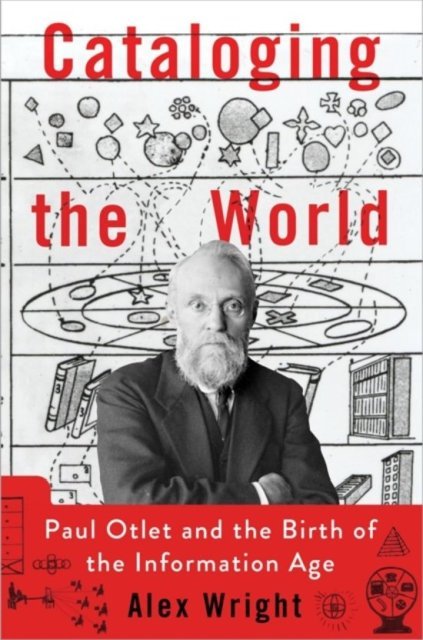Titre
Cataloging the world : Paul Otlet and the birth of the information age.
Auteur
Wright, Alex.
ISBN
9780199931415
Éditeur
Oxford & New York : Oxford University Press, 2014. Hardcover. Dustjacket. ix,350 pp. Conditie: als nieuw
Prix
€ 20,00
Détails
Conditie: als nieuw. HISTORY OF SCIENCE
Plus d'informations
Contents : Machine generated contents note: -- Introduction -- 1. The Libraries of Babel -- 2. The Dream of the Labyrinth -- 3. Belle Epoque -- 4. The Microphotic Book -- 5. The Index Museum -- 6. Castles in the Air -- 7. Hope, Lost and Found -- 8. Mundaneum -- 9. The Collective Brain -- 10. The Radiated Library -- 11. The Intergalactic Network -- 12. Entering the Steam -- Conclusion. - The dream of universal knowledge hardly started with the digital age. From the archives of Sumeria to the Library of Alexandria, humanity has long wrestled with information overload and management of intellectual output. Revived during the Renaissance and picking up pace in the Enlightenment, the dream grew and by the late nineteenth century was embraced by a number of visionaries who felt that at long last it was within their grasp. Among them, Paul Otlet stands out. A librarian by training, he worked at expanding the potential of the catalogue card -- the world's first information chip. From there followed universal libraries and reading rooms, connecting his native Belgium to the world -- by means of vast collections of cards that brought together everything that had ever been put to paper. Recognizing that the rapid acceleration of technology was transforming the world's intellectual landscape, Otlet devoted himself to creating a universal bibliography of all published knowledge. Ultimately totaling more than 12 million individual entries, it would evolve into the Mundaneum, a vast "city of knowledge" that opened its doors to the public in 1921. By 1934, Otlet had drawn up plans for a network of "electric telescopes" that would allow people everywhere to search through books, newspapers, photographs, and recordings, all linked together in what he termed a réseau mondial: a worldwide web. It all seemed possible, almost until the moment when the Nazis marched into Brussels and carted it all away. In Cataloging the World, Alex Wright places Otlet in the long continuum of visionaries and pioneers who have dreamed of unifying the world's knowledge, from H.G. Wells and Melvil Dewey to Ted Nelson and Steve Jobs. And while history has passed Otlet by, Wright shows that his legacy persists in today's networked age, where Internet corporations like Google and Twitter play much the same role that Otlet envisioned for the Mundaneum -- as the gathering and distribution channels for the world's intellectual output. In this sense, Cataloging the World is more than just the story of a failed entrepreneur; it is an ongoing story of a powerful idea that has captivated humanity from time immemorial, and that continues to inspire many of us in today's digital age"--. "In 1934, a Belgian entrepreneur named Paul Otlet sketched out plans for a worldwide network of computers--or "electric telescopes," as he called them -- that would allow people anywhere in the world to search and browse through millions of books, newspapers, photographs, films and sound recordings, all linked together in what he termed a réseau mondial: a "worldwide web." Today, Otlet and his visionary proto-Internet have been all but forgotten, thanks to a series of historical misfortunes -- not least of which involved the Nazis marching into Brussels and destroying most of his life's work. In the years since Otlet's death, however, the world has witnessed the emergence of a global network that has proved him right about the possibilities -- and the perils -- of networked information. In The Web that Wasn't, Alex Wright brings to light the forgotten genius of Paul Otlet, an introverted librarian who harbored a bookworm's dream to organize all the world's information. Recognizing the limitations of traditional libraries and archives, Otlet began to imagine a radically new way of organizing information, and undertook his life's great work: a universal bibliography of all the world's published knowledge that ultimately totaled more than 12 millionindividual entries. That effort eventually evolved into the Mundaneum, a vast "city of knowledge" that opened its doors to the public in 1921 to widespread attention. Like many ambitious dreams, however, Otlet's eventually faltered, a victim to technological constraints and political upheaval in Europe on the eve of World War II.
- Tous les livres sont en état complet et normal, sauf indication contraire. De petites imperfections comme une page collée ou un nom sur la feuille ne sont pas toujours mentionnés
- Vous gérez directement cette commande avec Kloof Antiquariaat
- Après votre commande vous et Kloof Antiquariaat recevrez une confirmation par e-mail. Dans l'e-mail que vous pouvez trouver, vous pouvez trouver le nom et l'adresse de Kloof Antiquariaat
- L'acheteur paie les frais de livraison, sauf accord contraire
- Kloof Antiquariaat peut demander un prépaiement
- Boekwinkeltjes.nl essaie de rapprocher les acheteurs et les vendeurs. Boekwinkeltjes.nl n'est jamais impliqué dans un accord entre l'acheteur et le vendeur. Si vous avez un différend avec un ou plusieurs utilisateurs, vous devez le réparer vous-même. Vous indemnisez Boekwinkeltjes.nl de toute réclamation.


